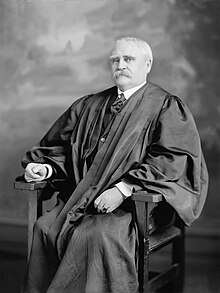Horace Harmon Lurton
Horace Harmon Lurton (* 26. February 1844 in Newport , Campbell County , Kentucky ; † 12. July 1914 in Atlantic City , New Jersey ) was an American lawyer , the university teachers and finally judge on the US Supreme Court ( US Supreme Court ) was.
Life
The son of a doctor made during the Civil War, his military service in the Confederate States Army , became a Sergeant Major transported and fell twice in captivity . After the end of the Civil War, he studied first at Douglas University and then at the Law School of Cumberland University , which he completed in 1867 with a Bachelor of Laws (LL.B.). Lurton, who joined the academic association Beta Theta Pi while studying, began practicing as a lawyer in 1867 after being admitted to the state of Tennessee .
After he was a judge at the sixth Tennessee Chancery Court between 1875 and 1878 , he resumed his practice as a lawyer and was then a judge at the Tennessee Supreme Court from 1886 to 1893 . He then became a judge at the US Court of Appeals for the sixth judicial district in 1893 and held this office until 1909. In addition, he was Professor of Constitutional Law of the USA at the Law School of Vanderbilt University from 1899 to 1910 and was also Dean of the between 1905 and 1910 Law School.
On January 3, 1910, he was appointed by US President William Howard Taft as an associate judge at the Supreme Court of the United States and thus successor to Rufus Wheeler Peckham, who died on October 24, 1909 . He held the office of Associate Justice until his death and was replaced by the previous US Attorney General James C. McReynolds after his burial at Greenwood Cemetery in Clarksville .
During his membership in the US Supreme Court, he worked on the important decision Weeks v. United States (1914) with. In it, the court had ruled that if investigative bodies gain evidence through illegal arrest, improper search or disapproving questioning methods, it would be excluded from use in a process ( exclusionary rule ).
Publications
- Which shall it be, a government of law or a government of men? , 1910
Web links
- Biography (Supreme Court Media)
- Horace Harmon Lurton in the nndb (English)
- Horace Harmon Lurton in the database of Find a Grave (English)
- openlibrary.org
Individual evidence
- ↑ Weeks v. United States , 232 US 383 (1914)
| personal data | |
|---|---|
| SURNAME | Lurton, Horace Harmon |
| BRIEF DESCRIPTION | American lawyer |
| DATE OF BIRTH | February 26, 1844 |
| PLACE OF BIRTH | Newport , Campbell County , Kentucky |
| DATE OF DEATH | July 12, 1914 |
| Place of death | Atlantic City , New Jersey |
